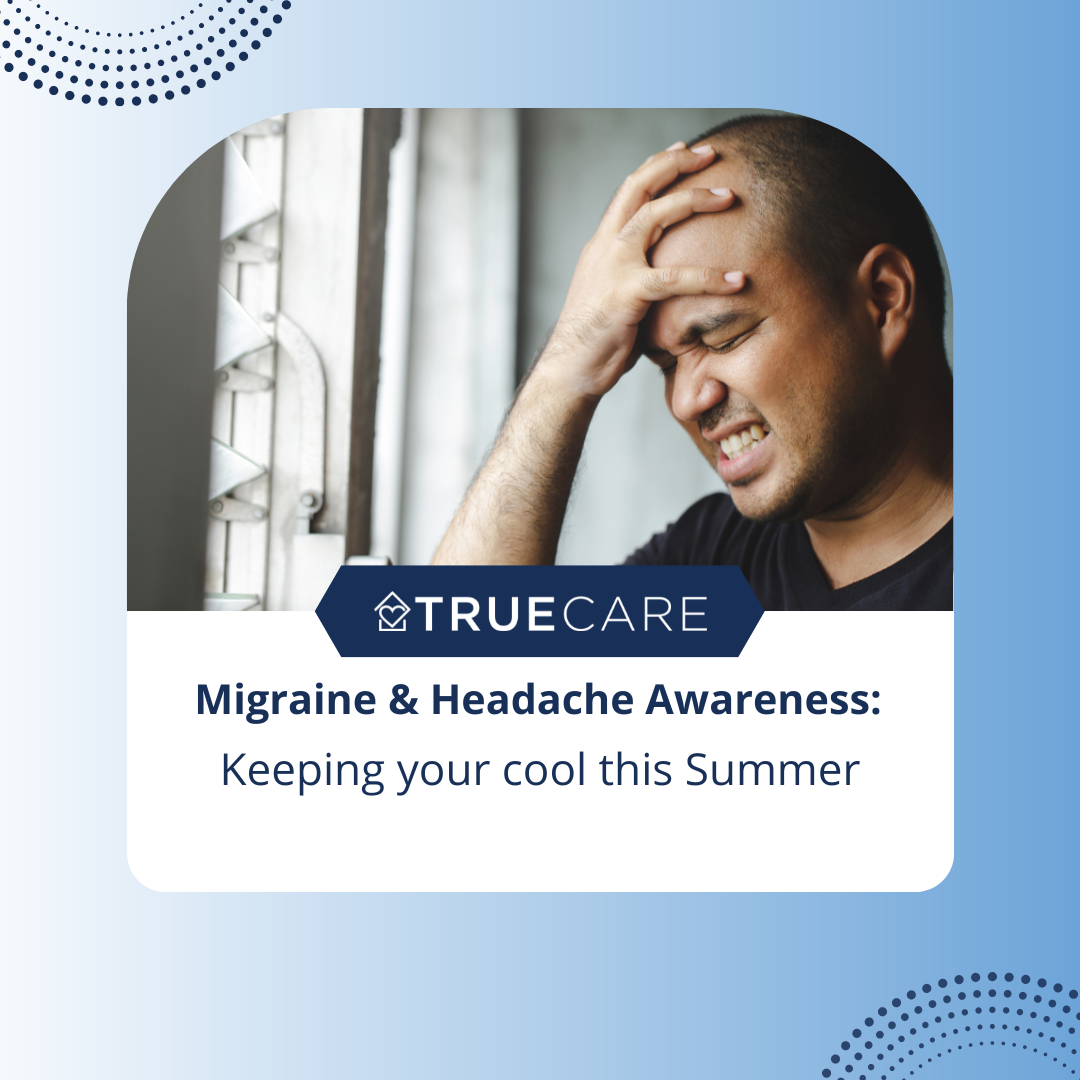Ever wonder why your head starts to hurt after a long day in the sun? Or why you might feel dizzy and lightheaded more often in warmer temperatures? With the increase in temperatures during the summer comes an increase in sweat and dehydration which causes headaches, and in some cases, a migraine headache. If not taken seriously, the summer sun can be dangerous. Since June is Migraine and Headache Awareness Month, it’s the perfect time to prepare for the summer and raise awareness on the effects of heat and why headaches and migraines are more common in the summer. Join us this month as we discuss headaches, avoiding headaches, and ways to keep your cool this summer.
Types of headaches:
Though headaches are very common, and we all experience them sometimes, they are often associated with specific diseases, which can cause people to believe they can only get headaches if/when they’re sick. Since this may not always be the case, it's important to familiarize ourselves with the different types of headaches. Not only will this help with identification and prevention of future headaches, it also helps us practice understanding our bodies, which is vital in the warmer months. The different types of headaches include:
- Tension headaches: Tension headaches are the most common type of headache. People may experience occasional tension headaches and don’t need to seek medical care. However, tension headaches in 15 days of the month or more, should be discussed with a primary care provider. These headaches are caused by tense muscles around the head and neck, and are often due to stress, anxiety or depression. Tension headaches may also be triggered by alcohol, caffeine, dental problems, eye strain, uncomfortable head position, or insufficient sleep.
- Migraines: Migraines are a severe, recurring type of headache that is often debilitating. The exact cause of migraines is unknown, however researchers believe that genetics play a part. Migraines can be triggered by several factors. Certain foods, drinks and ingredients may also trigger migraines, especially if other triggers are present at the same time such as aged cheeses, fermented food, chocolate or processed meats. This is because these foods contain tyramine which can cause our blood vessels to expand.
- Cluster headaches: People with cluster headaches will have daily or almost-daily headaches for weeks or months, separated by a month or more with no headaches. They start as sudden, severe headaches on one side of the head, and may also cause a stuffy nose, drooping eyelid, a watery eye, swelling or redness on the same side as the pain. The pain typically feels like a burning or sharp pain on the side of the face. Pain often peaks within the first 10 minutes and can last for up to two hours. Cluster headaches typically start within two to three hours of falling asleep but may also happen while awake.
- Diagnosing headaches: Physical exams are required for diagnosing headaches. The provider will take a look at medical history and ask about symptoms. They may also order blood tests, neurological testing or imaging tests to get more information and rule out other possible medical conditions that could be causing the headaches. Tracking headache symptoms in a calendar or journal can help identify triggers. The information collected may also help the provider decide what treatment options are best.
Headaches and Heat:
Headache frequency may rise during warm temperatures for a number of underlying reasons, including dehydration, environmental pollution, heat exhaustion, and even heat stroke. Mild dehydration may cause headaches year round for some, but in the summer, hot temperatures and excessive sweating can make dehydration more prevalent. To prevent dehydration and headaches this summer, drink at least 8 ounces of water daily, and eat foods that are rich in water, such as watermelon, strawberries, peaches, oranges, cucumbers, tomatoes, and celery.
Preventing & Treating headaches:
Oftentimes we don’t know whether we have a tension headache or a migraine. The easiest way to distinguish them is by the severity of the pain. Unlike headaches, which range from dull to acute pain, migraines are often so debilitating that the acronym pound (Pulsating pain, One day duration, Unilateral pain, Nausea and vomiting, Disabling intensity) is sometimes used to summarize key migraine signs and symptoms.
Headache Treatments and Prognosis:
Treatment for the different types of headaches can look like:
- Treating Tension headaches: Chronic tension-type headaches are typically treated with stress reduction techniques such as meditation or Cognitive Behavioral Therapy. Over-the-counter pain medications (e.g., ibuprofen or acetaminophen) may be used to decrease pain. Muscle relaxers or prescription antidepressants may also be recommended in some cases. Occasional tension headaches can often be prevented by exercising regularly, getting enough sleep, maintaining good posture, and managing daily stress.
- Treating migraines: There is no cure for migraines, but there are steps that can be taken to help relieve the symptoms. Over-the-counter migraine pain relievers may help. Medication is most effective when taken as early as possible during a migraine. Lifestyle changes like exercising regularly, eating a balanced diet, having a regular sleep schedule and taking steps to manage daily stress are often helpful in preventing or decreasing the frequency of migraines. For frequent migraines, doctors may prescribe blood pressure, anti-seizure, or anit-depressant medications.
- Treating cluster headaches: Acute cluster headaches are often treated with anti-inflammatories, triptan medication or dihydroergotamine (DHE) injections. Antidepressants, corticosteroids or medications for allergies, blood pressure, and seizures may be used for long-term treatment or prevention. Identifying and avoiding triggers and dealing with stress are essential parts of managing cluster headaches. Surgical options may be recommended when medications and avoidance of triggers are ineffective (ex. implanting a neurostimulator to send electrical signals to specific nerves).
To enjoy summer activities while avoiding migraine headaches, True Care suggests these tips to help:
- Avoid caffeinated beverages as they can cause dehydration. Stick to plain water. Eating a salty snack with water helps in rapid rehydration.
- Run errands and exercise in the cooler morning or evening hours
- Apply cold packs to the head and/or neck when experiencing intense sun exposure
- Stay hydrated with cool beverages. Quick hydration is best achieved from water mixed with electrolytes such as sports drinks. Some other sources of electrolytes include coconut water, bananas, milk, avocado, and broccoli.
- Wear sunglasses while in the sun. Consider wearing polarized sunglasses to block harmful glare, especially when going to the beach or lake.
- Keep a "headache diary" for several weeks to determine if there are any specific foods or occurrences that are causing the headaches
Summing it up:
Overall, drinking enough water and limiting your time in the sun can take you very far in terms of preventing headaches and migraines this summer. Headaches can be debilitating, but there's a lot you can do to prevent or even treat them. Knowing the different types of headaches can be useful in understanding what kind of headache we have, and what treatment options are best. Prevention techniques are always useful to have on hand as well, as they decrease the chances of getting a headache or migraine overall.
If you’re worried about the safety of a loved one this summer, contact True Care and we’ll guide you through our care options to ensure your loved one is safe and cool this summer.




